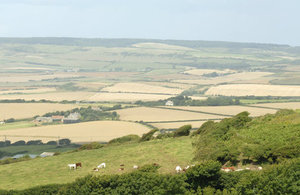Environment Secretary pledges cuts to farming red tape
Environment Secretary Andrea Leadsom outlined today how red tape will be scrapped to help farmers get on and grow fantastic British food.

Countryside
Billboards publicising EU funding and rules on how many crops farmers should grow are examples of red tape that should be scrapped when we leave the European Union, Environment Secretary Andrea Leadsom said today.
Speaking at the Oxford Farming Conference to leaders from the food and farming industry, the Environment Secretary highlighted EU regulations that are weighing down farmers in mountains of paperwork and stopping them getting on with the job of growing fantastic British food.
Dealing with red tape and farm inspections is estimated to cost the industry £5million per year and the loss of 300,000 hours. The Government will be consulting industry later this year on areas they would like to see reformed, and how a more common sense approach could be applied.
In a keynote speech Andrea Leadsom said:
For too long, a bureaucratic system which tries to meet the needs of 28 countries has held farmers back.
But now, leaving the EU means we can focus on what works best for the United Kingdom.
By cutting the red tape that comes out of Brussels, we will free our farmers to grow more, sell more and export more great British food whilst upholding our high standards for plant and animal health and welfare.
My priority will be common sense rules that work for the United Kingdom.
Following the UK’s departure from the EU, we will be free to:
-
Scrap rules requiring farmers and rural businesses to pay for and display billboards or posters to publicise the EU contribution for grants to grow their businesses. These signs - measuring as much as 6ft x 4ft for the biggest grants - must be displayed permanently to avoid a penalty.
-
Ditch the ‘three crop rule’ which sets out how many different crops farms must plant each year and free 40,000 farmers to grow the foods people want - adding millions of pounds to the economy.
-
Relax rules requiring complicated definitions applied across Europe to identify features in farmers’ fields for subsidy payments – such as what makes a hedge a hedge or when a puddle becomes a pond – and instead adopt a simpler approach.
-
Reduce the amount of paperwork flood-hit farmers need to provide to support claims for repairs for recovery of their land, allowing them to get on with urgent building work more quickly.
-
Reduce the number of government inspections on farms, by streamlining them or replacing them by better use of aerial photography. We’ve already cut 4,000 inspections this year and aim to remove 20,000 by 2020.